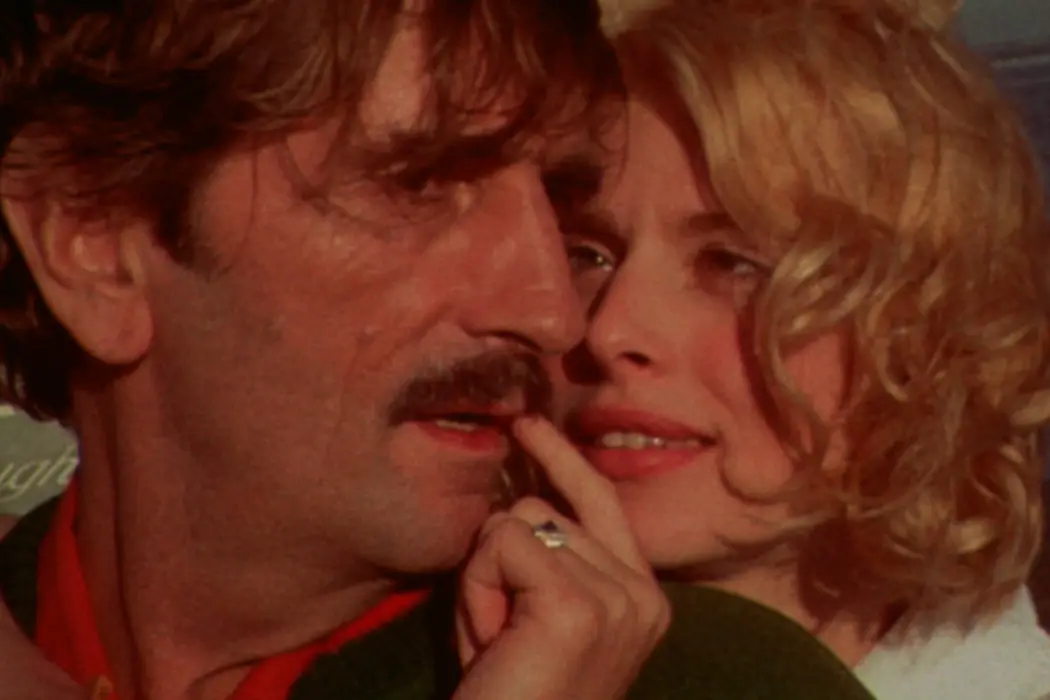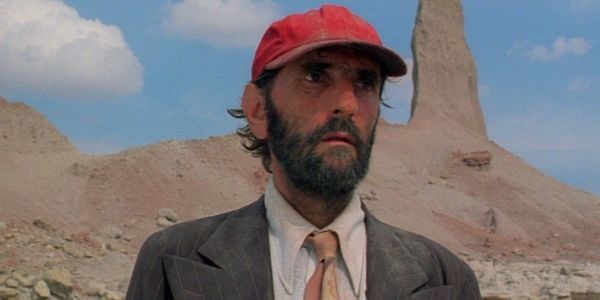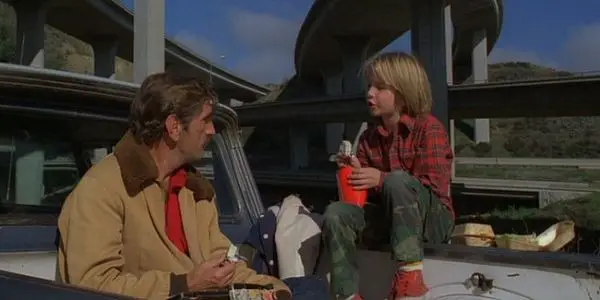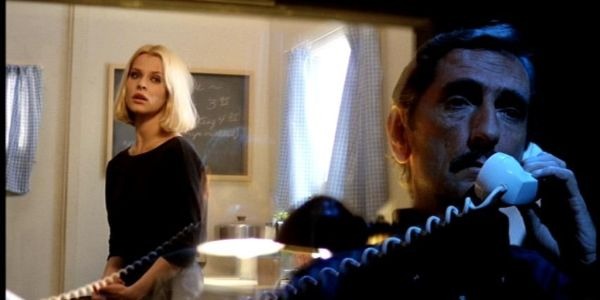PARIS, TEXAS: European Art House Meets The Great American Road Movie In Stunning Fashion

Tynan loves nagging all his friends to watch classic movies…
It occurs to me only someone with an outsider’s perspective would choose to make this movie, which is void of any prototypical Hollywood flair. No American would have thought in a million years to cast Harry Dean Stanton (a lifelong character actor) and Dean Stockwell (an all but forgotten child star) as leads while capturing such a cross-section of the United States. Therein lies the immediate allure of Paris, Texas.
We must begin with the locales. There’s little doubt they are indeed as American as can be and yet director Wim Wenders, backed by a joint French and West German venture, has embarked on something unequivocally his own. The film’s title perfectly reflects this blending of Americana with European sensibilities. Of course, the Heartland of the U.S.A. is evident. Anyone who has trekked across Middle America, stayed in a cheap motel, or found the nearest rest stop, knows it well because it turns up so many other places aside from Texas.
It is a film reflecting the degradation of this vast country as much as the austere beauty. Cinematographer Robby Müller captures rundown junk heaps, forgotten turn-offs, billboards, and roadside diners because they are just as much a part of the American experience as any amount of decadence. One might say they are even more indicative of the generally accepted cultural norm.
Especially in its opening moments, Paris, Texas readily evokes a bit of the ruggedness of the Old West. What others might envision as the mystique of America with one of its distinctly original mythologies. It is the kind of imagery at home in a John Ford picture, a director who was himself one of the foremost purveyors of this mythos.

The hard-edged twang of Cy Cooder‘s utterly definitive slide guitar score gives us a very concrete inclination of our world. The only time I can recall anything similar might be the minimalist music to go along with Murder by Contract (1958). The pure simplicity of it plays exquisitely against the already sparse imagery. Anything more might be overpowering. As is, it’s just right.
The Beginning of The Exodus
Travis (Stanton) all but materializes in our story almost like an extra-terrestrial lifeform. He wears his iconic ensemble of a red baseball cap with his suit and tie. Red tones course through the entire film in fact. There’s no missing it again and again. However, in these opening moments, it does feel like Travis never had a true beginning just as he merely dissipates in the end. This almost otherworldly quality readily dictates the entire conventionality of the landscape.
When his brother Walt (Stockwell) receives news of his whereabouts, he dutifully goes to fetch him. He and his wife Anne (Aurore Clement) are the ones with feet firmly placed in some form of contemporary reality. He is a billboard ad man and they have taken in Hunter (Hunter Carson) as their own son.
Stanton is catatonic and yet there is a near robotic purposefulness to his steps. He has a bit of Forrest Gump in him but this is also not quite right. He undoubtedly is plagued by some form of amnesia, which nonetheless is never fully acknowledged. Walt expects his brother to talk after four years off the grid and he rarely obliges.
As they travel back to Los Angeles, the movie rolls along leisurely, content to be almost cavalier with its runtime. Because it wouldn’t be a road trip if you didn’t take your sweet time but it’s certainly a European strain of road film. Giving its pacing, we might easily segment Sam Shepard‘s story into three distinct parts. The opening moments in Texas set the scene, there’s the interim in Los Angeles, environmentally so different, and then the final odyssey back into the heart of The Lone Star State.

Surely the film lacks pure authenticity but in its place, we are met with spellbinding subtlety, equal parts poetic and mundane. We must only watch the characters a few moments to know they hardly function as we would. It starts with Stanton and radiates out from there down to his son and finally his long-lost wife Jane (the exquisite Nastassja Kinski), who is the object of his journeying.
There is parental negligence going all but unquestioned. They never seem to cling to bitterness. Even the little boy seems mature beyond his years, ready to embark to the ends of the earth with his recently returned father. It’s as if this one quest galvanizes their relationship without question. There is no need to put words to it. They intuitively understand each other as flesh and blood, no matter the years that may have gotten between them.
Stanton himself is a walking corpse who nonetheless never seems in need of sustenance or sleep. And the extraordinary phenomenon, thanks to time, is the establishment of a new status quo, a slightly modified version of the world, which we readily come to accept. Maybe it’s the foreigner’s perspective I mentioned in passing or a more pensive contentment with the world. I cannot say exactly lest the film loses some power.
The Quest for Reconciliation
Regardless, the final act by some piece of cinematic ingenuity manages to be continually gripping. Perhaps as an audience, we become more attuned and simultaneously conditioned to the pacing. Because while the journey might seem slight, it’s no less of a journey.
With one concrete lead – a bank in Houston, Texas – father and son set off to find the third member of their fragmented family, staking out the bank with walkie-talkies and waiting for her arrival. Finally, she does and Travis makes contact in a garish back alley peep show.

However, despite the sullied outer layer, it’s in this environment of anonymity, provided by a phone connection and a two-way mirror, that allows him to communicate with her in the adjoining room. The pretenses of such a place fall away as the film manages to unearth a tragic intimacy of heartbreak and melancholy in the wake of lost love.
The immaculately staged climax is made up of a restrained monologue – a moment shared between a man and a woman – as he recounts their story. It’s a single scene that must go on for 10, 15, 20 minutes. Except we never realize it. She thinks she is providing a service to the person on the other end of the line, being a listening ear, and she is. But then he solemnly recounts their romance and recognition begins to don on her face.
He pours out his heart matter-of-factly and honestly, turned away from the glass as not to see her in this compromising world. It makes it exponentially easier for the words to leave his lips as she listens, captured equally in every painful recollection. But there is no emotional outbreak, no breaking of glass, or the like. This is purely an exercise in loneliness and regret.
Not until after the fact does the boldness of this scene set in because it’s so easy to get caught up in the moment. We understand the implications and yet we’re desperately trying to perceive the situation, wanting to know if she recognizes him. Even more so, we want to know what they will do.
Paris, Texas: Conclusion
Striking the perfect note of resolution and continued inscrutability, mother and son are finally reunited in a maternal embrace and just as he arrived into the world, Travis fades into the night just as easily.
I can imagine Paris, Texas is a place that is meaningful to Travis in the same vein Nevers and Hiroshima hold importance to the lovers in Hiroshima, Mon Amour (1959). It’s really not a place at all but a part of his identity, a destination he is hoping to get to, a dream he is doggedly pursuing on earth. He is ever searching, always wandering, but in the midst of it, he maintains an unswerving capacity for love. Even though he’s made mistakes we can hardly comprehend, family remains his guiding compass.
What other films use location well to reflect distinct aspects of character and the world itself? What are the pros and cons of making a film as a foreigner in a place opposed to knowing it intimately? Tell us your thoughts in the comments below!
Paris, Texas was originally released in the U.S. on November 2, 1984. It can be purchased on DVD or Blu-Ray through the Criterion Collection for home viewing.
https://www.dailymotion.com/video/x54bhx2
Does content like this matter to you?
Become a Member and support film journalism. Unlock access to all of Film Inquiry`s great articles. Join a community of like-minded readers who are passionate about cinema - get access to our private members Network, give back to independent filmmakers, and more.
Tynan loves nagging all his friends to watch classic movies with him. Follow his frequent musings at Film Inquiry and on his blog 4 Star Films. Soli Deo Gloria.













